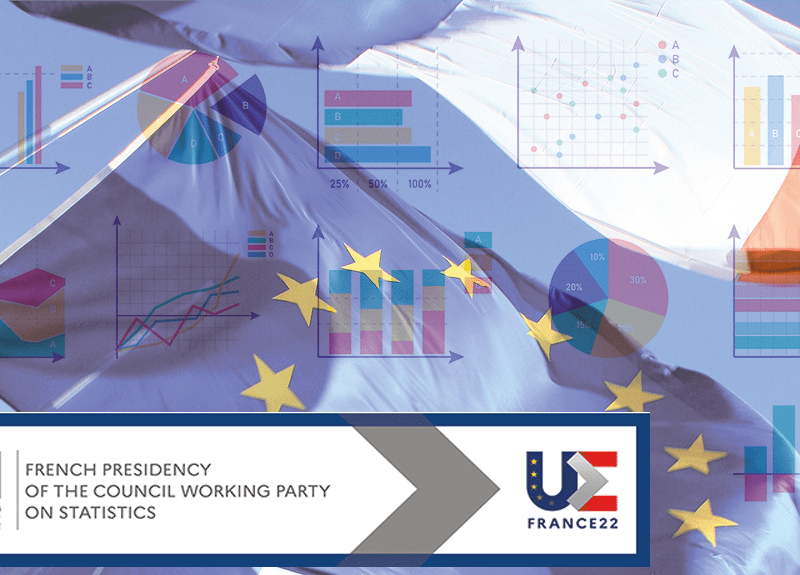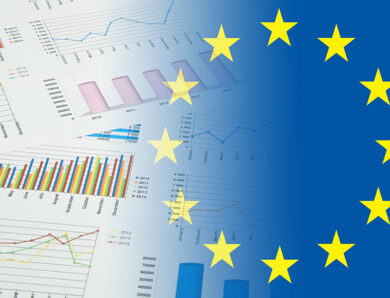
For us statisticians, Europe is part of our everyday life
As France is currently taking over the Presidency of the Council of the European Union, INSEE will preside over the destiny of European statistics. The availability of harmonised, reliable and rapidly produced data is increasingly necessary to fully support the single market, to better enable the steering of European public policies as well as to further facilitate meaningful comparison with other EU countries. As a matter of fact, two thirds of ourvarious statistics here at INSEE are currently produced under a European regulation.
Our first challenge as European statisticians is to produce easily comparable statistics. The second challenge is to ensure strong confidence in European official statistics, one which requires great professional independence and impartial, high-quality production. Both are guaranteed by the European Code of Practice, first adopted in 2005, and the Regulation on European Statistics (223/2009). The Code notably provides a shared framework for the regular visits of our European peers. In 2021, the report by these independent experts concerning France concluded that a high level of compliance with the principles of the Code have been reached.
Since the 1st of January 2022, France has taken charge of the Council of the European Union’s Presidency for the next six months. INSEE and, more broadly, our Ministerial Statistical Offices will be actively involved: the Institute will lead the ongoing negotiations on different European statistical regulations within both the Council’s statistical group as well as part of the tripartite meetings with the European Parliament and the Commission. We will naturally provide this leadership with the full support of those Ministerial Statistical Offices in charge of the regulations concerned.
Indeed, this Presidency is an excellent opportunity to highlight the strong commitment of the National Statistical Institutes to Europe. In the early 1990s, the first stage of the Economic and Monetary Union resulted in the achievement of the single market, the creation of a single currency and the adoption of the Stability and Growth Pact. At the same time, European statistics have been developed considerably: National Accounts, the Consumer Price Index, Intra-EU Trade, etc. Then, at the beginning of the 2000s, the need for short-term indicators was further reinforced. Fully harmonised at the European level, these indicators are crucial to ensuring good governance of the Economic and Monetary Union and to steering the monetary policy of the European Central Bank (ECB). The time-frame for the publication of quarterly accounts has been shortened, and business and labour market statistics have been further refined, particularly with regard to the number of hours worked. In addition, the Lisbon Strategy has also set ambitious targets regarding the quantitative and qualitative development of employment and social cohesion in the social area.
More recently, in April 2021, a new European regulation, called the « Single Market Programme », defined the key strategic objectives to be achieved by European statistics for the coming years 2021-2027. Beyond the more traditional and long-established themes, new dimensions were added, such as Sustainable Development, Globalisation and Digital Transformation, as well as one aimed to fight against misinformation. Much more emphasis has been put on making full use of new data sources.
The European Statistical System, which consists of Eurostat, the European Statistical Office, the National Statistical Institutes and the National Statistical Authorities producing European statistics in each Member State, is collectively being further organised to meet these rapidly growing new demands. Both production and dissemination of European statistics are framed, for each field of enquiry, by statistical regulations aiming to harmonise the respective data produced by the National Statistical Services of the Member States. This harmonisation is based on a set of shared definitions, concepts and even methods. Here at INSEE, more than two thirds of our various statistics were in fact produced in 2021 under a European regulation. This illustrates how important European issues are for all of us, as statisticians.
Comparability of statistics: a key issue
The availability of cross-country comparable statistics within the European Union is essential for the effective economic governance of the Union. These data are also very useful for monitoring European policies on social, economic and territorial cohesion, sustainable development, agricultural policy as well as globalisation. Moreover, evidence-based decision-making requires timely availability of European statistics. Beyond meeting the needs of the European Union stricto sensu, these European statistics also benefit not only each Member State – which should be able to compare their results with those of their European neighbours – but also any other interested users, including individuals and companies. This comparability of European statistics is therefore a key feature, however difficult this is to ensure. In effect, harmonisation by product (output) and not by inputs (in terms of collection processes) is generally the adopted standard for the production of harmonised statistics at the European level.
Thus, National Statistical Institutes are required to produce their statistics in accordance with the definitions, conceptual frameworks and Quality standards agreed to in the European Statistical Regulations. They have no obligation to implement a specific data-collection process. However, when the need for comparability is very strong, harmonisation may involve the methods used to collect the data (by survey for example) or even the dedicated questionnaires, which therefore become common to all European countries. This is in particular the case for the component of the Labour Force Survey used to measure the unemployment rate. In other respects, countries can use innovative methods, insofar as they meet the specific requirements of statistical regulations. Given the different backgrounds of each country and the great diversity of National Statistical Systems, whether or not they are based on administrative registers, it is actually unfeasible to make a generalised input-harmonisation compulsory. On the other hand, it is fundamental that we have the ability to rely on internationally defined and proven concepts (e.g. ILO unemployment, Consumer Price Index), on shared classifications (European classification of economic activities, classification of levels of education) as well as on common conceptual frameworks (European national accounts handbooks). It is also extremely important that our statistics are produced according to rigorous Quality criteria. Each Member State is thus expected to provide specific Quality reports explaining in details how they meet their European requirements. These reports therefore enable a deep analysis of the European comparability between the national statistics produced.
Quality and Independence: a Code of Practice at the heart of European commitments
The serious case of « falsified » Greek government deficit statistics, which was made publicly known in 2004, gravely undermined the credibility of both the National Statistical Institutes and Eurostat. This led to a Commission strategy aimed at improving the Quality of fiscal statistics and more broadly at developing European standards, with a view to better ensuring the independence of National Statistical Institutes. A European Statistics Code of Practice, adopted by the European Statistical System Committee, was thus promulgated in the Commission Recommendation of 25 May 2005 relating to the independence, integrity and accountability of national and community Statistical Services. This Code is structured around 16 principles, in its latest updated version, that of 2017: seven principles relating to the institutional environment, four to statistical production processes and five to statistical outputs.
Figure 1 – The 16 principles of the european statistics code of practice

The foundations of the future Regulation 223/2009 on European statistics were in this way set in place. In addition, the process of creating the European Statistical Governance Advisory Board (ESGAB) was on track; this Authority was effectively established in 2008. Its specific role is to independently ensure compliance with the principles of the European Statistics Code of Practice for the European Statistical System as a whole, and not for each individual Member State separately. At our national level and within a close timeframe, the French Official Statistics Authority (ASP) was created in 2008 as part of our Law for Economic Modernisation. The ASP ensures the principle of professional independence in the design, production and dissemination of official statistics. This key principle of remaining independent of any pressure from political, regulatory or administrative bodies, as well as from private sector actors, guarantees the credibility of our statistics. The French Official Statistics Authority also plays a vigilant role with regard to the Quality of official statistics, both in terms of methodological rigour and compliance with professional ethical principles. This Authority guarantees the reliability of the different data produced, the transparency of their production and dissemination processes, as well as their relevance to the various needs expressed. It takes for its reference the European Statistics Code of Practice in its 2017 version.
The third European Peer Review: a very positive report for the French Statistical System
Following the Commission’s recommendation of May 2005, self-assessments carried out by both National Statistical Institutes and Eurostat were initially undertaken using dedicated questionnaires. These self-assessments made it possible to evaluate the state of play with regard to each of the indicators relating to the principles of the Code of Practice, as well as the appropriate actions considered at national and European levels aimed at further improvement. Then, from 2006/2007 onwards, peer reviews (including statisticians from other European National Statistical Institutes) were set up to validate these self-assessments. They have since been organised every six to seven years and concern each Member State as well as Eurostat. As regards France, these reviews have been held in 2006/2007, in late 2014, and finally in 2021. INSEE and the Ministerial Statistical Offices (SSM) of Agriculture, Ecological Transition as well as Health and Social Affairs were directly involved in this most recent review. Moreover, the entire French Official Statistical Service was included in this specific exercise, particularly with regard to compliance with Principle 1bis « Coordination and cooperation ». The first phase of the review consisted of sending out, for each of the four audited bodies, self-assessment questionnaires in March 2021, relating to the 16 principles of the European Statistics Code of Practice, together with evidence of their compliance. Thereafter, a dedicated team of four European peers remained on site for an entire week at the end of June actively auditing the respective staff and meeting with governance bodies of our French official statistics, namely the French Official Statistics Authority (ASP), the National Council for Statistical Information (CNIS), as well as with various external data providers and users of official statistics.
The final report of the peer review has just been made public on the websites of INSEE, of the three audited Offices, as well as on that of Eurostat. The peers’ conclusions shine a very positive light on the French Official Statistical System. The peers underline the high degree of maturity reached by the French Official Statistical Service and point out the strengths of our underlying legislative framework. They also consider that its governance is a strength, with bodies such as the ASP and the CNIS guaranteeing the independence and relevance of a Statistical System that effectively meets users’ needs. The reactivity of INSEE and more broadly of the French Official Statistical System during the current pandemic, which made it possible to study the impact of this crisis in real time by mobilising new data sources in an innovative way, was also recognised by the peers. The high level of coordination within the French Official Statistical Service, notably with regard to Quality management, is also considered a strength, largely due to the fact that both INSEE and the Ministerial Statistical Offices have committed to a dedicated Quality strategy formalised in 2017. As in the previous reviews, the peers also acknowledge the sound expertise throughout the French Official Statistical Service, in particular thanks to the high level of training provided by the different schools of the Group of National Schools of Economics and Statistics (Genes).
In brief, the peers appreciate the significant progress made since the previous review and conclude that there is a high level of compliance with the principles of the Code within the French Official Statistical Service. Indeed, the peers proposed only 16 recommendations to further improve our compliance. Some of these recommendations require action by other stakeholders outside the French Official Statistical Service, such as those that call for Ministries to increase the involvement of statisticians when developing the administrative data used for official statistics, or to extend the possibility of the French Official Statistical Service of accessing private data. INSEE, in close collaboration with all the Ministerial Statistical Offices, are now committed to drawing up a targeted action plan by the end of January 2022, to be implemented over the next six years, in response to these recommendations. An annual follow-up will then be put into place to ensure its implementation. ■
Additionnal information
- France in the European Union, data and studies
- The Third European Peer Review 2021
- Regulation 223/2009 on European statistics
- Bureau D., 2020, « L’Autorité de la statistique publique : dix ans d’activité pour une statistique indépendante et de qualité », Courrier des statistiques no. 5, Autorité de la statistique publique, December
- Piffeteau H., 2019, « A New Judicial Triptych for European Statistics », Courrier des statistiques no. 3, INSEE, December
- Tavernier J-L., 2018, « A statistical system integrated in the national central administration: The French experience », Courrier des statistiques no. 1, INSEE, December




